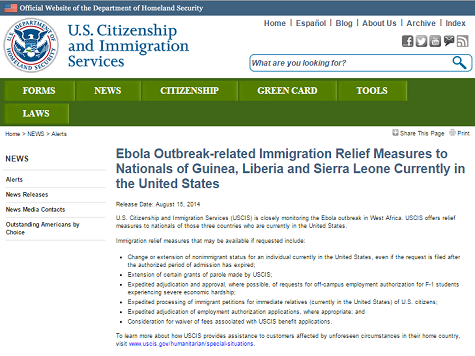AUSTIN, Texas — As Ebola continued to ravage communities in West Africa this summer, U.S. Citizenship and Immigration Services (USCIS), a division under the Department of Homeland Security (DHS) announced “immigration relief measures” for citizens of three countries affected by the deadly virus.
The relief measures, announced on the USCIS website as “Ebola Outbreak-related Immigration Relief Measures to Nationals of Guinea, Liberia and Sierra Leone Currently in the United States,” on August 15, 2014, include the following:
- Change or extension of nonimmigrant status for an individual currently in the United States, even if the request is filed after the authorized period of admission has expired;
- Extension of certain grants of parole made by USCIS;
- Expedited adjudication and approval, where possible, of requests for off-campus employment authorization for F-1 students experiencing severe economic hardship;
- Expedited processing of immigrant petitions for immediate relatives (currently in the United States) of U.S. citizens;
- Expedited adjudication of employment authorization applications, where appropriate; and
- Consideration for waiver of fees associated with USCIS benefit applications.
In short, the USCIS has been waiving fees, expediting the immigration process, and allowing extensions of visas for anyone coming from the three designated Ebola-stricken countries, provided that they are in the United States. The Free Republic blog reported that the law firm of Edward W. Neufville, III, LLC, a Washington, D.C. area immigration firm, added a section to their website two days after the USCIS announcement, with more details about how these relief measures would work, including extensions of the time that the foreign national could remain in the United States, additional work permit opportunities, and even forgiveness for failure to appear at required interviews or submit required evidence. According to the Neufville firm, the new USCIS policies mean that “[i]ndividuals from Liberia, Sierra Leone, and Guinea currently in the United States may apply for an extension or change in status due to the Ebola Outbreak, even if their request is filed after the authorized period of admission has expired.” Otherwise stated, this means that someone from one of those countries who illegally overstayed their visa can now apply for an extension, or someone who arrived illegally can apply to get legal status.
Thomas Eric Duncan, the Liberian man who died from Ebola earlier this month, had traveled to the United States after his visa was approved in August, the same month that USCIS announced the new relief measures. One of the concerns many have had about the Ebola crisis is the lure those in the affected countries would — quite understandably — feel toward the advanced sanitation standards and medical care available in American hospitals, similar to how open borders, social services, and in-state tuition have been criticized as creating “magnets” for immigrants to illegally cross the U.S. – Mexican border. These specific USCIS policies do not apply to those who are not yet in the United States and are seeking a visa to leave Guinea, Liberia, or Sierra Leone, but the more generous rules that await them once they arrive likely create further incentives for them to attempt to travel here.
According to the Washington Post, the number of visas issued to Liberians by the United States has spiked, with about 3,500 visitor visas granted to Liberians last year, and another 10,000 granted to people from Guinea and Sierra Leone during that same time period. The Post also reported that Liberians also have a very high rate of “visa overstays,”the fifth highest after Cuba, Burundi, Eritrea and the Democratic Republic of Congo, according to immigration expert Jessica Vaughn with the Center for Immigration Studies. Vaughn has sharply criticized the Obama administration’s immigration policies regarding Ebola, noting that Kenya and other African countries have closed their borders to any travelers from Ebola-afflicted areas.
[Hat tip: Doug Ross, DirectorBlue]
Follow Sarah Rumpf on Twitter @rumpfshaker.

COMMENTS
Please let us know if you're having issues with commenting.